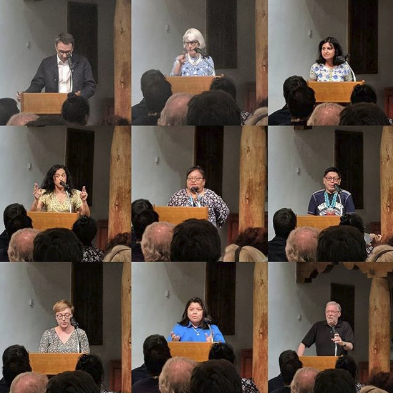Listen to the Introductory Presentations by SAR’s 2019 Resident Scholars, Interns, and King Native Artist Fellow

On Wednesday, September 18, 2019, SAR hosted the annual introductory presentations by the incoming resident scholars, Anne Ray interns, and the 2019 Rollin and Mary Ella King Native artist fellow.
This year’s fellowships are funded in part by the Weatherhead Endowment, the Katrin H. Lamon Endowment for Native American Art and Education, the Anne Ray Foundation, and the Andrew W. Mellon Foundation.
Listen to the full introductory presentation or skip to the individual speakers below:
2019 Introductory Colloquium
C.J. Alvarez // Mellon Fellow
Alvarez’s book, A History of the Chihuahuan Desert, is the first history of the desert organized around the territory of an ecosystem, focusing on how human experiences on the ground have been shaped by desert conditions. Dr. Alvarez’s work elevates the voices of desert and border dwellers so that they can be heard and understood by those living outside the drylands of the international divide.

C.J. Alvarez Introductory Presentation (5:06 min)
Patricia Crown // Weatherhead Fellow In 1896 archaeologists opened a room in Pueblo Bonito, Chaco Canyon, that was closed and burned by the Chacoan people around AD 1100. Inside that room lay the majority of all known Chacoan cylinder jars—a vessel form now known to have been used in consuming cacao-based drinks. The dramatic destruction of the vessels on that day in the early twelfth century speaks both to the power of the jars and the importance of terminating them to remove that power when the ritual associated with them was rejected by the Chacoan people. Dr. Crown explores the interconnections among drinking practices, the catalytic potency of animated objects, crafts production, exchange, ritual, knowledge, and status hierarchies.

Patricia Crown (4:26 min)
Rashmi Sadana // Weatherhead Fellow The arrival of the Delhi Metro—an ultra-modern, high-tech, and highly surveilled urban rail system and South Asia’s first major multiline metro—has become a touchstone for discussions of urban development, gendered social mobility, and India’s increasingly aspirational culture. Dr. Sadana’s research illustrates how different classes of Indians intersect in the day to day and shows what is at stake for ordinary people, as well as governments, when it comes to the promise of infrastructure. Her project lays out the aspirational landscape of people’s daily itineraries while also exploring how the state—Delhi’s urban agencies and the Delhi Metro Rail Corporation—manages the city’s development in a process that Sadana terms “aspirational planning.”

Rashmi Sadana (6:18 min)
Fátima Suárez // Mellon Fellow The Meanings of Latino Fatherhoods focuses on the diverse experiences of Latino men in the role of fathers and explores how their cultural experiences influence their views of what it means to be a good father and a good man. For Suárez’s project she pursues such questions as, how do the intersections of class, age, and generation in the United States affect Latino men’s understandings of fatherhood; how do Latino men enact the meanings they attach to fatherhood; how do Latino men monitor one another’s fatherhood; and how do Latino fathers describe the emotional labor of fathering?

Fátima Suárez (5:38 min)
Davina Two Bears // Anne Ray Fellow Davina Two Bears’s research documents the history of the Old Leupp Boarding School (OLBS), a Navajo federal Indian boarding school in operation from 1909 to 1942, and explores Diné (Navajo) survivance within the context of this school. Two Bears employs decolonizing research methods framed by postcolonial theory to investigate the OLBS, which currently exists as a historic archaeological site. She explores how her Diné ancestors utilized their cultural foundations to meet the challenges imposed upon them by a settler society and relates the positive stories of Native survivance achieved within the OLBS.

Davina Two Bears (5:43 min)
Timothy Edaakie // Rollin and Mary Ella King Native Artist Fellow Zuni potter Timothy Edaakie comes to SAR with a goal of researching and reviving traditional pottery methods, forms, and designs that are not currently being used in the pueblo and is particularly interested in the transition between Matsaki and A:shiwi styles.

Timothy Edaakie (9:52 min)
Amanda Sorensen // Anne Ray Intern Sorensen grew up in the suburbs of Chicago, on the traditional homelands of the Ojibwe, Potawatomi, Odawa, Menominee, Miami, and Winnebago/Ho-Chunk nations, and graduated with undergraduate degrees on the north side of the city at Loyola University Chicago. Earlier this year, she completed my MA in Anthropology with a concentration in Museum Studies at the University of British Columbia on unceded Musqueam territory.

Amanda Sorensen (4:16 min)
Erin Monique Grant // Anne Ray Intern Grant is a tribal member of the Colorado River Indian Tribes (Hopi!) and grew up in Tempe, Arizona. She recently completed her Master’s Degree in the History of Design and Curatorial Studies from The New School in New York City. Her experience has included internships at museums across the New York metro area including the Metropolitan Museum of Art, working on their new indigenous collection and exhibit.
